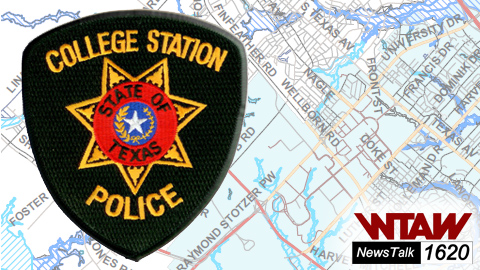
Police Assistant Patricia Logan with the College Station Police Department visits with WTAW’s Bill Oliver about safety tips for the start of the new school year.
A news release from the College Station and Bryan Police Departments:
On the way to school:
Plan a walking route to school or the bus stop. Choose the most direct way with the fewest street crossings and, if possible, with intersections that have crossing guards.
Walk the route with your child beforehand. Tell him or her to stay away from parks, vacant lots, fields and other places where there aren’t many people around.
Teach your child never to talk to strangers or accept rides or gifts from strangers. Remember, a stranger is anyone you or your children don’t know well or trust.
Be sure your child walks to and from school with a sibling, friend, or neighbor.
Teach your kids — whether walking, biking, or riding the bus to school — to obey all traffic signals, signs and traffic officers. Remind them to be extra careful in bad weather.
When driving kids, deliver and pick them up as close to the school as possible. Don’t leave until they are in the schoolyard or building.
Be sure that your child knows your home phone number and address in case of emergency
After School safety, if the kids are alone after school for a short time, make sure that they follow some basic guidelines:
They should keep the doors locked.
They should never tell someone on the phone that there are no adults at home. Teach them to say that you can’t come to the phone right now.
Post a list of emergency phone numbers near the phone.
Have them call you at work or on your cell phone as soon as they arrive home.
Set up rules on what kind of food they can fix. Younger children should never use the stove without adult supervision.
Be sure to set up guidelines on who they can have over (if anyone) and what they are allowed to do.
Make sure your child knows when and how to call 911.
What should parents do now for child safety this school year?
* Familiarize yourself with school or provider drop-off and pick-up practices and then be sure you always follow them.
One of the biggest complaints by school officials is that parents find a reason to be an exception to the rule. If the curb or sign says “No stopping, standing or parking at any time,” that means everyone. If children are required to use designated cross walks, don’t walk your child across the middle of a street just because you’re holding his or her hand. If traffic is supposed to be one way at designated times, be prepared to change your traffic pattern. And, if an area is designated for teacher parking only, then don’t grab a space to drop off your child because you think it’s just for “a couple of minutes.”
* Discuss the rules with your child and practice with younger ones. If possible, take your child to the drop-off area and “practice” the procedure at an off-peak time. Have your child wear his backpack (if required) and walk him through what to look for, what to do, and what not to do. If crossing guards are utilized, explain their purpose and how they must wait for approval to cross. Younger children understand best by actually “doing” a routine instead of just being told about it. Familiarity and then repetition are the best guidelines for ensuring child safety all school year long.
* Resist the urge to speed or make any traffic rules exception because you are running late. Whipping your car around, getting your child to dash out of the car to reach the classroom before the school bell rings, or encouraging a “drop-and-dash” drop-off is the recipe for disaster in terms of child safety. You would rather your child receive a tardy notice than to be in an accident.
* Know all traffic rules concerning school zones and traffic flows. Remember, ignorance of the law is not an excuse. Drive your pattern now and familiarize yourself with the various speed zones. Be aware of which side of the car your child sits, and consider positioning her to the side most convenient for exiting. If your child is in a “drop” situation, see if the child seat or booster seat is something he can put on or off safely; the same holds true for lap belts and shoulder harnesses.
* Do not use your cell phone, palm, or any other distracting device while in or around school zones. The use of cell phones in school zones is against State law. The law (Texas Transportation Code 545.425) states that: “An operator of a motor vehicle may not use a wireless communication device in a school zone unless the device is “hands free or the vehicle is stopped.” Violators of this law face a fine up to $200, plus additional court and state fees.
Motorists should:
Slowdown in residential neighborhoods as children are riding bicycles and walking to the bus stop or school.
When buses extend the stop signal and activate their red warning lights you must stop and wait as children board school buses.
